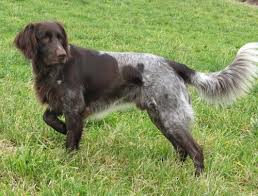
German Longhaired Pointer
Conditions of detention
German Longhaired Pointers thrive in rural or suburban environments where they have ample space to run and explore. They require a significant amount of exercise and mental stimulation, making them less suited to apartment living unless their activity needs are met. Access to open spaces, such as parks or countryside, is ideal.
Useful Fact: GLPs are highly adaptable and can adjust to various living conditions as long as they receive sufficient exercise and attention.
Nutrition and diet
A balanced diet is crucial for the health and vitality of the German Longhaired Pointer. High-quality commercial dog food that provides a good mix of protein, fats, and carbohydrates is recommended. Their diet should also include essential vitamins and minerals to support their active lifestyle.
Useful Fact: Regular monitoring of their weight and adjusting their food intake based on their activity level is important to maintain a healthy weight.
Health
German Longhaired Pointers are generally healthy dogs, but like all breeds, they are prone to certain health issues. Common health concerns include hip dysplasia, elbow dysplasia, and some hereditary eye conditions. Regular veterinary check-ups and maintaining a healthy lifestyle can help mitigate these risks.
Useful Fact: Genetic testing and responsible breeding practices can help reduce the incidence of hereditary health issues in GLPs.
Grooming and care
The German Longhaired Pointer has a beautiful, long, and dense coat that requires regular grooming to keep it in good condition. Brushing several times a week helps prevent matting and removes loose hair. Bathing should be done as needed, using a gentle dog shampoo. Regular ear cleaning and nail trimming are also important parts of their grooming routine.
Useful Fact: Their long coat can pick up debris and burrs, so it’s important to check and clean their coat after outdoor activities.
Education and training
German Longhaired Pointers are intelligent and eager to please, making them relatively easy to train. Positive reinforcement methods, such as treats, praise, and play, work best. Early socialization and obedience training are essential to ensure they grow into well-behaved adults.
Useful Fact: GLPs excel in various dog sports and activities such as agility, obedience, and field trials, providing both mental and physical stimulation.
Toys and entertainment
GLPs are active and enjoy a variety of toys and games that keep them mentally and physically stimulated. Fetch toys, chew toys, and puzzle toys are great for keeping them entertained. They particularly enjoy activities that involve retrieving and using their natural hunting instincts.
Useful Fact: Interactive toys that challenge their problem-solving skills can help prevent boredom and destructive behavior.
Safety
Due to their strong prey drive and high energy levels, German Longhaired Pointers should be kept on a leash or in a securely fenced area when outdoors to prevent them from wandering off or chasing after small animals. Supervision is important, especially in unfamiliar environments.
Useful Fact: Microchipping and ID tags are essential for ensuring they can be returned if they get lost.
Accessories
A comfortable, sturdy harness is recommended for walks, as GLPs are strong and may pull on the leash. They may also benefit from a cooling vest during hot weather to prevent overheating.
Useful Fact: Reflective gear can enhance visibility during evening walks, ensuring their safety.
Socialization
Early socialization is crucial for German Longhaired Pointers. Exposing them to various people, environments, and other animals helps prevent shyness or aggression. Puppy classes and regular outings can be beneficial.
Useful Fact: Positive experiences during socialization help them develop into confident and well-adjusted adults.
Travel and Transportation
German Longhaired Pointers generally travel well if introduced to car rides from a young age. Ensure their safety and comfort by using a secure crate or dog seat belt during car travel. Regular breaks during long trips are important for their comfort.
Useful Fact: Familiarizing them with travel crates and carriers can make journeys less stressful and more enjoyable.
Behavior and psychology
German Longhaired Pointers are known for their friendly, loyal, and intelligent nature. They form strong bonds with their families and are generally good with children and other pets. Understanding their high energy levels and providing sufficient exercise and mental stimulation can help manage their behavior.
Useful Fact: Their strong hunting instincts can be positively channeled through training and structured activities, reducing the likelihood of behavioral issues.
Legal aspects
Owning a German Longhaired Pointer requires understanding and adhering to local pet ownership laws, including leash laws, noise regulations, and registration requirements. Microchipping your dog is recommended for identification purposes.
Useful Fact: Some areas may have specific regulations regarding pet travel, so check the requirements if you plan to travel with your GLP.


